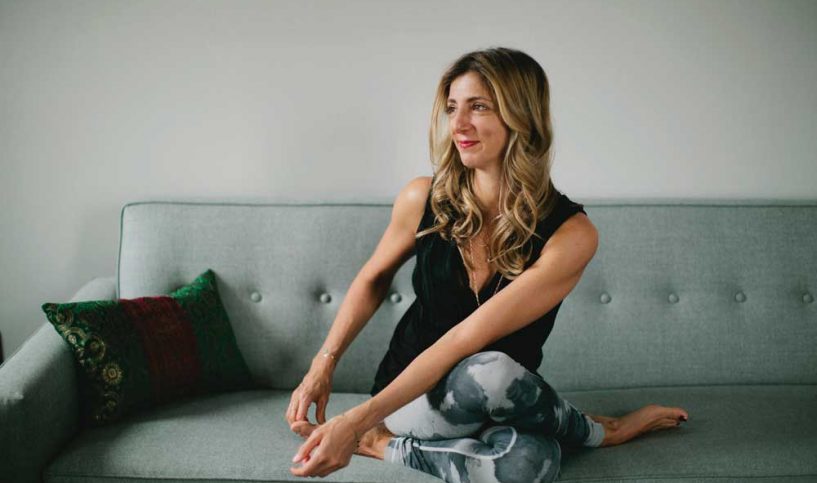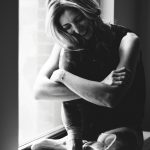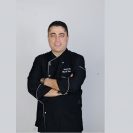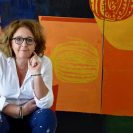By Reem Al-Gharabally.
If you plan to attend Rima Rabbath’s yoga class at the Jivamukti Yoga Center in New York City, you better turn up early to get a spot. The granddaughter of Edmond Rabbath, the acclaimed Lebanese jurist and writer, is one of New York City’s most popular yoga teachers with an average class size of 70 people every time she teaches.
Her regulars say, despite the large numbers, she has the uncanny ability to remember everyone’s name and we wondered if she has a special trick. She laughs and says in her characteristically husky voice, “I don’t think of myself as someone who has a visual memory, but when someone tells me their name I very sincerely and genuinely try to be present at least for the moment they are giving me their name and it somehow gets recorded in my memory.”
She considers herself one of the luckiest yoga teachers in the world because many of the people in her class are regulars who attend up to four times a week. She adds, “There is nothing like walking into a class at the Jivamukti Yoga center in New York City and knowing almost everyone there and the energy that emanates from 76 people not minding having no space between the mats because they understand the only space they need is within themselves.”
She admits she has never read any of her famous grandfather’s books. Edmond Rabbath is well known for his writings on Pan-Arab unity and one of the architects and commentators of the Lebanese constitution.
“He lived on the ground floor of the building where I grew up – politics and intellectual discussion and books were very much part of the environment. I have some of his books in French and in Arabic but they are very dense.”
Despite her family’s intellectual credentials Rima was drawn to sports and played competitive tennis for most of her teenage years, the discipline from which she says she applied to her yoga practice later in life.
She has lived in New York City for the past 20 years, first working as a marketing consultant with Colgate-Palmolive until she discovered yoga. Her destiny unfolded and she stepped into her role as one of the city’s most sought after yoga teachers.
“I never visualized being a teacher. I find that the things in my life that have fallen into place in the most auspicious way, have been those where I had a perhaps hunch about but didn’t cling onto the idea,” she says. “The same with teaching. I was still working in marketing when I did my yoga teacher training in 2005.”
How does she reconcile the yoga teachings, which says that we should not cling onto cultural separation between people, and reflecting on cultural identity? Rima says, “When I first left, the first thing I would say was ‘I grew up in the war’. I am a product of the war. Now it is something that is part of me but I try not to hold onto it as much.”
“Arabs who are living abroad want to hold onto their identity because when you leave your homeland that is what keeps you connected, reminds you of your heritage, so it is a very natural human thing to want to remember, not to forget. There is a difference between forgetting and letting go or dropping the story line. Forgetting is like trying to push something into a bottom drawer. Dropping the story line is seeing what your habitual patterns are.”
What is your favorite part of your job?
I am a yoga teacher and my favorite part of the job is to connect with people from all walks of life on a very subtle, raw, authentic level, where all facades and masks have been dropped off. People are extremely vulnerable in a very courageous and fearless way when they come to the practice – even if it is their first time. There is something about walking into a yoga room that kind of disarms you in a very wonderful way.
What are you working on currently?
I am launching my website finally after 9 years of teaching. It is called Souk. It is an event-based company where I collaborate with artists from different fields to create an experience for students of yoga. So the platform will facilitate the exchange of information, talent and energy just like goods in a traditional souk. So let’s say an artist could be creating a piece live as I am teaching a yoga class, and that piece and also collateral materials will be available for sale to the participants, but also for those who didn’t participate.
What do you find most different about life inside and outside the Arab world?
I grew up in Beirut. There is an intimacy that is unmatchable. I would say in Beirut, but probably in other cities of the Arab world. It is an intimacy that is something people begin to cherish when they leave the Arab world. It can feel overwhelming when you are in it, but then it is something that you miss when you leave. There is a hospitality that is also indescribable and unmatchable and a cultural way of being that is traditional, but also at the same time modern. And it is that mix that is so magical in a way. I can speak for Beirut but I am sure it would be the same in many different cities of the Arab world.
What do you find most different about work inside and outside the Arab world?
Somehow there is this idea floating around that things don’t run as effectively inside the Arab world. And maybe that’s the reality for some, but I know that often, things get done more quickly inside the Arab world because you know someone who knows someone who knows someone. The difference is really a difference in perception.
Where are you originally from?
I was born and raised in Beirut. I left at the age of 16. I had one foot in East Beirut and one foot in West Beirut. It is a very particular story, but my parents divorced when I was 6 and a half. I grew up in East Beirut, but my Mum moved to West Beirut and they shared custody, so I literally had a foot in each side. I grew up with my Dad and ended up going to school in East Beirut, but I was often stuck in West Beirut when I went to spend weekends with my Mum. Crazy as it sounds, my school had two branches in both East and West, so whenever I was stuck on one side I would go to school in West Beirut. It was nice because I did not feel the separation that a lot of kids ende up experiencing just because they were going to school on one side versus the other side.
Where is most of your family?
All my family is in Beirut. I do not have family abroad.
What were the circumstances under which you/your family left your home country?
It was unplanned. I was about to take my French Baccalaureate. I was in high school. I was 16 and a half and the war was raging and the airport was closed, so I had to take my French Baccalaureate in September instead of June. The whole summer we were in the basement because of the war. So in September my parents, along with parents of other friends of mine, decided we could go to Paris to take our French Baccalaureate because they had special seats for people who could not do it like the Lebanese. We went by boat from Beirut to Cyprus in one of those very long, slow boats. It took us 12 hours and they were shelling the sea so just to get on the boat was a big ordeal. We got to Cyprus – we had not seen the sun for the whole summer so we hung out in Cyprus for a week and then we went to Paris. I was just supposed to be there for 2 weeks for my exam but I ended up staying for 4 years.
Where have you lived?
Beirut, Paris and New York City
What is your favorite thing about where you live now?
I love everything about NYC. I love that it is a city where I can walk everywhere. It makes life so much more intimate and approachable. I know it sounds counter-intuitive as NYC seems inaccessible, but it is not so once you live here, especially below 14th street in Manhattan.
What is the worst thing about where you live?
Nothing! But if I put my mind to it, I would say it is the sound of the sirens. It’s such a vivid reminder of how life can tip the other way at any moment, a reminder of impermanence – the hallmark of our existence.
Where will you eventually retire?
I love New York. It is totally my hometown so I want to grow old in New York, but ideally I would like to have a beach house somewhere. Of course Beirut, Lebanon is my hometown – a house in Lebanon in the mountains and a beach house somewhere else would be ideal.
Finish this sentence: In a year from now I will be…
I will be as happy as I am today.
Finish this sentence: When I die, I will…
…be re-born.
To find out more about Rima, or to get in touch with her, you can visit her profile at www.jivamuktiyoga.com/users/rima-rani-rabbath. She will have her own website soon, which is still under construction, but will be available shortly at www.soukofrima.com. Photography by Hailey Wist.












